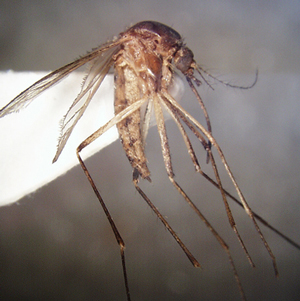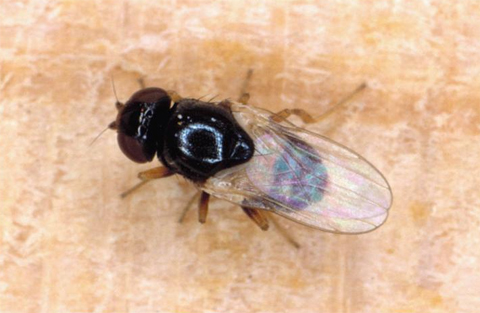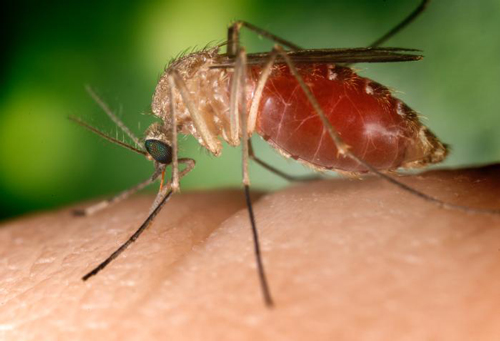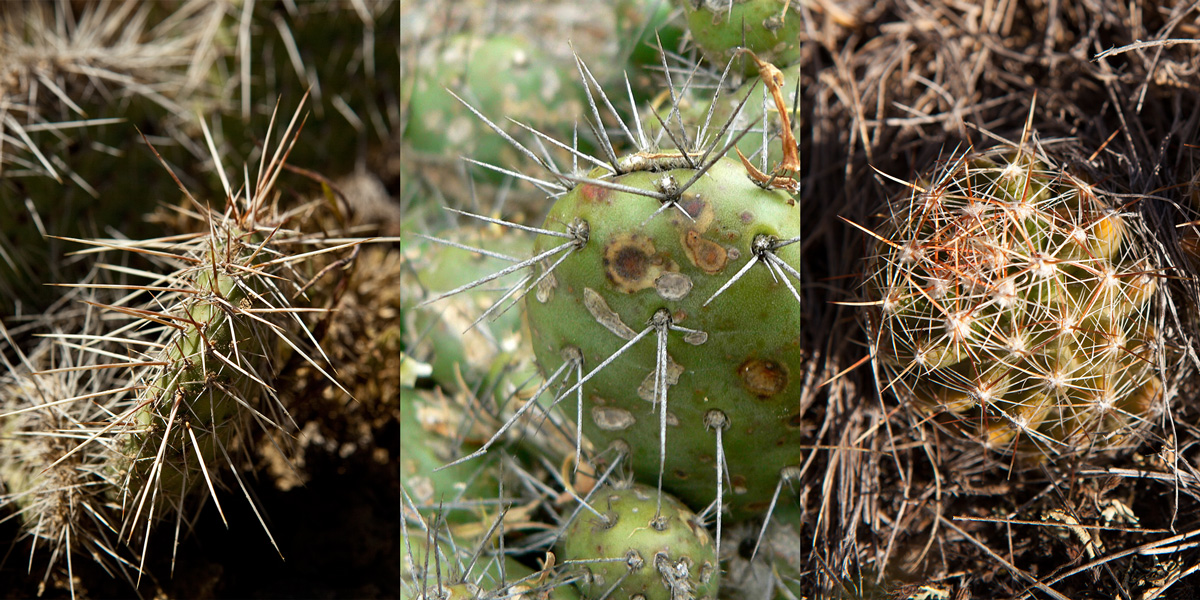“our trio of pests still invade and obstruct us on all occasions,
these are the Musquetoes eye knats and prickley pears,
equal to any three curses that ever poor Egypt
laiboured under except the Mahometant yoke.”
Our Trio of Pests
There was still one last straw to be borne. Mother Nature seemed to have mounted an indomitable conspiracy against the entire expedition. Besides the grizzlies that stalked his hunters by day, and the wolves that raided their stores of meat by night, she mercilessly sent a trio of scourges to “invade and obstruct” them to the verge of madness: Mosquitoes! And on top of mosquitoes, eye gnats! And to challenge almost every step of their thinly moccasined feet, cactuses! How bad were those ground-level afflictions? Beginning in March 1804, each journalist had complained about them severally and monotonously in due season, but never transcended a mild, if pitiful, whine, never rose to even the mildest profanity or invective. In this case Lewis straightened up and distanced himself from those pests. He had his own inimitable means of measuring their true asperity. They were equal, he decided with a forgivable mixture of metaphors, “to any three curses that ever poor Egypt laiboured under,[1]An allusion to the epic duel between Moses and Pharaoh, which is described in the Biblical Book of Exodus, 7:8 through 13:16. except”—we can imagine his imperious frown relaxing into a wry smile over how much the sarcasm would amuse President Jefferson—”except the Mahometant yoke.”
Literary Analysis
Captain Lewis’s 36-word synopsis of what had been bugging him and his men is another of those literary poses that Lewis occasionally struck in his journaling, moments in which, as Clay Jenkinson has pointed out, he “strains after allusions, ideas, a lofty vocabulary, literary flair, and—often enough—profundity.” Or, in the present context, Lewis displays his talent for seeing the world metaphorically.[2]Clay S. Jenkinson, The Character of Meriwether Lewis (Reno, Nevada: The Marmarth Institute, 2000), 29. See also Jenkinson’s more recent book, The Character of Meriwether Lewis, Explorer in the … Continue reading Perhaps he pondered this particular vignette off and on for hours, days or weeks as he slapped at mosquitoes, waved off gnats, or plucked barbed spines from his feet, before he finally dashed it off. Today we cherish the comparatively small corpus of journal entries that he wrote in the field, and seek among them the rigorous order and brisk candor of the report that he wrote to President Jefferson on the day he arrived back in St. Louis.[3]Jackson, Letters, 1:319-24. Every serious student of the Lewis and Clark story spends hours or days trying to fathom the meanings of Lewis’s most enticing excursions away from the commonplace—as in his famous birthday meditation of 18 August 1805. But as enticing as they may be, those flashes of eloquence were for Jefferson’s eyes, not ours, and should be read merely as spontaneous conceits that he intended to polish at some later leisure.
Crammed in among unrelated remarks on disparate matters in the protean order in which they occurred, or came to his mind at the end of the day, it is no wonder that they seldom quite reached the clarity and grace of Jefferson’s literary style. This one is immediately preceded by the doleful observation that today they have left buffalo country behind, so their “harrvest of white puddings” [Charbonneau’s boudin blanc] is over; it is followed by an expression of empathy for his boatmens’ bone-deep weariness with the self-congratulatory statement that he encouraged them by learning to “push a tolerable good pole in their fraize.”
What if he had made good on his post-expeditionary promise to rewrite his field notes, and what if the overall result had never transcended the best of his momentary poses? His version might not have been a blockbuster, but it would have been a better read than Nicholas Biddle‘s earnest but arid narrative. Consider, for example, Biddle’s leaden paraphrase of Lewis’s almost-trenchant epigraph: “The mosquitoes, gnats, and prickly pear, our three persecutors, still continue with us, and joined with the labour of working the canoes have fatigued us all excessively.” The basic facts are still there, but the muscular arch and rhythm of Lewis’s phrasing has been levelled by the exclusion of his Biblical reference and his obscure metaphor of the “Mahometant” yoke. (Perhaps young Biddle didn’t get it either.)
The Mohometant Yoke
Lewis described three types of prickly pear between the Great Falls and Travelers’ Rest. In the above photo, moving left-to-right, are three likely candidates:
Plains prickly pear, Opuntia polyacantha, photographed 12 July 2011 at the Great Falls.
Brittle prickly pear, Opuntia fragilis, photographed 12 June 2006 near Travelers’ Rest.
Pincushion cactus, Pediocactus simpsonii, photographed 13 July 2013 near Beaver Creek, Missouri River, Helena Valley.
Lewis used the expression just this one time in his journals, and never again in anything else he wrote, as far as we know. It is quite possible that he picked it up from Edward Gibbon’s monumental History of the Decline and Fall of the Roman Empire, which was published in 6 volumes between 1776 and 1789. Gibbon used the metaphor of the yoke more than a hundred times to refer to oppressive political or religious regimes, but only three times did he invoke a “Mahometan yoke.” In one instance, for example, he cited Charles Martel’s victory over the Saracens at the Battle of Tours, France, in 732 A.D., which effectively halted Islamic expansion into western Europe, and “saved his country . . . from the Mahometan yoke.”[4]Edward Gibbon, The History of the Decline and Fall of the Roman Empire, ed. by Dean Milman, M. Giozot, and William Smith, 6 vols. (1788; New York: J. W. Lovell, 1845), 5:123.
Gibbon’s epochal study, based on primary contemporaneous sources rather than secondary personal reminiscences, initiated a new concept in historiography, but in the United States it was perhaps more talked about than read, and the metaphor of the yoke appears never to have reached the status of a popular catch-phrase. Jefferson, however, had read Gibbon’s massive volumes critically, and some of the gentlemen among his circle of friends undoubtedly knew it equally well,[5]Jefferson wrote of “the yoke of hierocracy” in a letter to his friend Gideon Granger on 3 May 1801, and of “the yoke of the mother country” in a draft fragment of his … Continue reading so Lewis may at least have heard it in their conversations, perhaps even from Jefferson’s lips. In any case, considering the circumstances that engulfed him as soon as he stepped into his role in the President’s office, his use of it to summarize two pestiferous insects and a heavily-armed plant suggests that he may have been inspired not by antiquarian literary parallels as much as by his recollection of the farce that was being played out on the Mediterannean “theater-in-the-round” when he left Washington. He may have meant it as a figurative expression and a private joke.
Becoming the President’s Secretary
On temporary leave from the First Infantry Regiment of the United States Army, Captain Lewis limped into the City of Washington on a lame horse on 1 April 1801 to commence service as the president’s private secretary. Jefferson, in his letter of invitation to Lewis, had only hinted at the character and scope of the job. It would involve, he wrote, “aid in the private concerns of the household,” as well as “contribution[s] to the mass of information which it is interesting for the administration to acquire.” Lewis’s main qualifications had been his “knolege of the Western country”—the trans-Allegheny West where Lewis, as regimental paymaster, had recently visited all of the frontier outposts —and, more importantly, “the army and of all it’s interests & relations.” Those issues were at the heart of Lewis’s first assignment.[6]Jefferson to Lewis, 23 February 1801, in Jackson, Letters, 1:2-3. By 26 March 1804 Jefferson was able to be more specific with William A. Burwell, the third candidate for the secretarial job, by … Continue reading
Only a few hours before Lewis arrived, the president had left Washington for Monticello and wasn’t due back until early May. Meanwhile, his steward Joseph Rapin, in charge of a housekeeper and three servants, would help Captain Lewis settle into his makeshift quarters in the still unfinished east wing of the huge residence.[7]Dumas Malone, Jefferson and His Time, vol. 4, Jefferson the President: First Term, 1801-1805 (Boston: Little, Brown and Company, 1970), 40. Lewis had hoped to go on to Albemarle to visit friends and family, but he had to wait for his replacement in the post of regimental paymaster to arrive to take over the payroll records. The lieutenant’s schedule was uncertain.[8]Lewis to Jefferson, 3 April 1801, Thomas Jefferson, Papers, 35 vols. to date (Princeton: Princeton University Press, 2008), 33:530. By the 10th Lewis was free to go to Richmond by stage—his horse still being too lame—and expected to stop at Monticello on the 20th.[9]Ibid., p. 565. In the meantime he could while away the hours catching up on back issues of the National Intelligencer, and contemplate the anticipated pleasures of getting to know some of the “characters of influence in the affairs of our country” who would give him “the advantage of their wisdom,” as the president had promised. Somehow he might have gotten an inkling that trouble with the Barbary states was looming on the eastern horizon.
Piracy in the Mediterranean Sea
When the two men finally met later in the month, the president would proceed to fill Lewis in on the conditions of current governmental affairs. There is no record of the topics that came up in those conversations, but foreign relations and international commerce would have been high priorities, because the burden of an ancient yoke, piracy in the Mediterranean Sea, and an accompanying threat of war, was weighing heavily on the new president’s shoulders.
Expanded Content


The story of what was known by his detractors as “Jefferson’s War,” opens for us a narrow window on a little known but intriguing episode in Meriwether Lewis’s brief position as the President’s secretary.


“The prickly pear is now in full blume,” he wrote on a mild early-summer day in 1805, “and forms one of the beauties as well as the greatest pests of the plains.”


“Our trio of pests still invade and obstruct us on all occasions, these are the Musquetoes eye knats and prickley pears, equal to any three curses that ever poor Egypt laiboured under.”


On 11 July 1805 while making canoes above the Falls of the Missouri, Clark wrote “Musquitors verry troublesom, and in addition to their torments we have a Small Knat, which is as disagreeable.”


In 1806, Noah Webster defined the noun yoke as “a bandage on the neck, chain, bond, bondage, mark of servitude, couple, pair.” The word yoke can also denote a type of wooden device to harness animals that have been bred and trained to pull heavy loads.
Notes
| ↑1 | An allusion to the epic duel between Moses and Pharaoh, which is described in the Biblical Book of Exodus, 7:8 through 13:16. |
|---|---|
| ↑2 | Clay S. Jenkinson, The Character of Meriwether Lewis (Reno, Nevada: The Marmarth Institute, 2000), 29. See also Jenkinson’s more recent book, The Character of Meriwether Lewis, Explorer in the Wilderness: Essays on One of the Most Remarkable Men in American History (Washburn, ND: The Dakota Institute Press, 2011), 151: “[Lewis] alone of the men of the expedition had the capacity to write with literary flair, to place his journal entries in a larger literary and historical context, to employ figurative language and rhetorical flourishes, and to see the world metaphorically.” |
| ↑3 | Jackson, Letters, 1:319-24. |
| ↑4 | Edward Gibbon, The History of the Decline and Fall of the Roman Empire, ed. by Dean Milman, M. Giozot, and William Smith, 6 vols. (1788; New York: J. W. Lovell, 1845), 5:123. |
| ↑5 | Jefferson wrote of “the yoke of hierocracy” in a letter to his friend Gideon Granger on 3 May 1801, and of “the yoke of the mother country” in a draft fragment of his Autobiography. Library of Congress, American Memory: The Thomas Jefferson Papers, Series 1. http://memory.loc.gov/cgi-bin/query/P?mtj:1:./temp/~ammem_WCNr:: and http://memory.loc.gov/cgi-bin/query/P?mtj:3:./temp/~ammem_WCNr:: (retrieved 23 September 2009). |
| ↑6 | Jefferson to Lewis, 23 February 1801, in Jackson, Letters, 1:2-3. By 26 March 1804 Jefferson was able to be more specific with William A. Burwell, the third candidate for the secretarial job, by outlining Lewis’s responsibilities: “The office itself is more in the nature of that of an Aid de camp, than a mere Secretary. The writing is not considerable, because I write my own letters and copy them in a press. The care of our company, execution of some commissions in the town occasionally, messages to Congress, occasional conferences & explanations with particular members, with the offices, & inhabitants of the place where it cannot so well be done in writing, constitute the chief business.” Quoted in Jackson, Letters, 1:3n. As a military, term aide-de-camp denotes “an officer who assists a general in his military duties, conveying his orders, and procuring him intelligence.” Oxford English Dictionary (Second Edition, 1989) Online. In a letter to Lewis Harvie, his second secretary, who served him from 6 June 1803 to March 1804, Jefferson revealed the depth and scope of knowledge about governmental matters that his secretaries could acquire: “You will have seen the letter of the Spanish minister, which we have forwarded to N. Orleans with an order from Spain to take off immediately the suspension of our right of deposit. To this I can add that we have formal assurances that the treaty of cession of Louisiana to France contained this clause ‘Saving the rights acquired by other powers in virtue of treaties made with them by Spain.’ That cession is probaby not yet finally settled between those powers, which has occasioned an unwillingness in them to say any thing of it to other powers.” Jefferson to Lewis Harvie, Jackson, Letters, 1:41-43. Lewis must have been privy to similarly sensitive issues during his tenure, but there are no written records of those details. Nevertheless it is easy to understand why the president would create not one but two special ciphers for Lewis to use when communicating sensitive matters to his commander-in-chief, even though ultimately they proved unnecessary. |
| ↑7 | Dumas Malone, Jefferson and His Time, vol. 4, Jefferson the President: First Term, 1801-1805 (Boston: Little, Brown and Company, 1970), 40. |
| ↑8 | Lewis to Jefferson, 3 April 1801, Thomas Jefferson, Papers, 35 vols. to date (Princeton: Princeton University Press, 2008), 33:530. |
| ↑9 | Ibid., p. 565. |
Experience the Lewis and Clark Trail
The Lewis and Clark Trail Experience—our sister site at lewisandclark.travel—connects the world to people and places on the Lewis and Clark Trail.
Discover More
- The Lewis and Clark Expedition: Day by Day by Gary E. Moulton (University of Nebraska Press, 2018). The story in prose, 14 May 1804–23 September 1806.
- The Lewis and Clark Journals: An American Epic of Discovery (abridged) by Gary E. Moulton (University of Nebraska Press, 2003). Selected journal excerpts, 14 May 1804–23 September 1806.
- The Lewis and Clark Journals. by Gary E. Moulton (University of Nebraska Press, 1983–2001). The complete story in 13 volumes.



